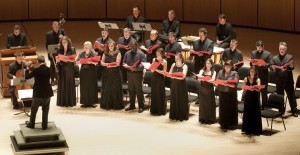
Seraphic Fire makes another iTunes conquest
Once again, Seraphic Fire has set the world of iTunes on its ear, climbing up into the top 10 on the Apple music service’s classical charts earlier this month with its newest disc, just as it did last year with its record of the Monteverdi “Vespers of 1610.” This year, it’s the Hausmusik version of the “German Requiem” of Johannes Brahms, in the composer’s own piano four-hands reduction, which premiered in London in 1871, three years after the standard orchestral version was first heard. One of the two pianists at that first performance was Cipriani Potter, a 78-year-old English composer and pianist who had been a good friend of Beethoven five decades earlier.
A 22-voice version of Seraphic Fire was joined by 30 singers from the Professional Choral Institute, a joint venture of the choir and the University of South Florida, for the disc, which was recorded in June at the University of South Florida campus in Tampa. The performance, featuring baritone Paul Max Tipton and soprano Teresa Wakim, was directed by Patrick Dupré Quigley, with pianists Justin Blackwell and Scott Allen Jarrett.
Michael Burgess, the choral ensemble’s marketing director, said the group’s iTunes success — the Brahms record charted at No. 5 a day after its release Monday — is part of a growing trend.
“More and more, as we go on to release more albums, people are learning to look for us,” Burgess said. “This is becoming something that’s happening more frequently. People know that quality music is now coming out of South Florida.”
Without its familiar orchestral garb, the “German Requiem” sounds more like many of Brahms’ other vocal compositions intended for home performance.
“It’s more like we’re doing the ‘Liebeslieder’ waltzes,” said Joey Quigley, the group’s operations manager and brother of Patrick. “It’s taking more of a collaborative approach … the tempos are brisker, more elastic.”
That’s certainly the case in the second section, the well-known “Denn alles Fleisch, est ist wie Gras,” which moves smartly along after the opening, choosing not to remain in the sense of funereal epic common to performances of this piece. Here, and in the opening “Selig sind, die da Leid tragen,” in which at both occurrences of the words “mit Freuden” (with joy), the tempo picks up to reflect the sentiment of the line.
The large size of the singing contingent (52 people) means things never sound thin or inadequate, but the textures, heard over a single piano, are more sharply etched. What can be heard here is the sound of Brahms’ other sacred music, particularly the motets, and his rich knowledge of the music of the past. It’s often forgotten that Brahms was a fine musicologist; it’s to him and his scholar friend Friedrich Chrysander that we owe the first modern performing editions of the keyboard music of Francois Couperin, for instance.
While the piano can’t replace the radiance of Brahms’ orchestral writing, this is a skillful, expert reading of the “Requiem,” and one that lets the listener hear things in the choral fabric he or she might not have noticed before, such as the complexity of the buildup at the end of “Herr, lehre doch mich.”
Quigley said the Professional Choral Institute singers came to USF to work with Seraphic Fire chorus master James Bass, who teaches at the college, and with choir “master teachers,” such as Misty Bermudez, who led the alto section. The Professional Choral Institute students rehearsed for nine days by themselves before being joined by the expanded Seraphic Fire singers to make the recording, he said.
“It came out really well,” he said. “We did two days of six hours each. [Recording producer] Peter Rutenberg did an amazing job.”
Burgess said the group will next be making a recording of its upcoming Christmas program, which features new arrangements by Patrick Quigley of “O Holy Night” and “Silent Night.” No other recordings are in the works yet, he said, and the choir is enjoying its current success with the Brahms, which, after all, required a lot of hard work.
“We’re kind of catching our breath right now. It’s a huge undertaking,” he said.
Recent Content
-
Artsarticle ·
-
Artsarticle ·
-
Artsarticle ·
